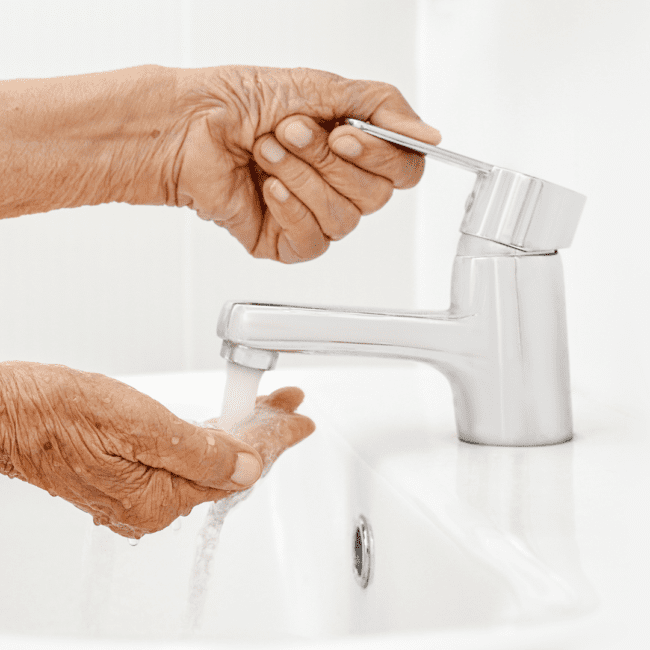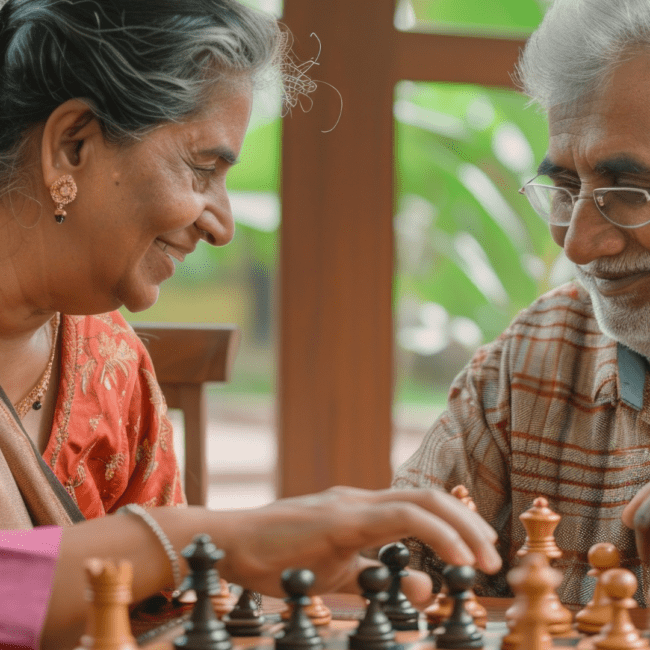Explore how assisted living provides a balance of independence and comprehensive care, including health management and social activities for seniors.”
In a traditional Indian large family setup, elder care was not a topic of worry. But now, with families evolving into smaller compact units and children residing in a different city or country, elder care is a concern. Even otherwise, elder care can be challenging in today’s fast-paced world. Children want to ensure their parents live a happy and safe life, as close to them being there to care for their parents as possible. And parents often don’t agree to relocate. Hence, present-day parents and children opt for Assisted Living Facilities for holistic care.
What is this concept called “Assisted Living”?
Assisted living is a housing or a long-term care facility for those who:
- Are unable to manage to live by themselves.
- Have specific physical or mental disabilities.
- Want to be independent without the botheration of housekeeping or maintenance activities like repairs, cooking, etc.
- Prefer the safety of community living or a social environment to living alone.
It is an old age or retirement home, but with many additional features and facilities to ensure smooth living for the seniors. Amenities and the kind of place required vary based on the needs and affordability.
Why to Choose Assisted Living for Elders?
Aged parents might find it extremely cumbersome to manage home maintenance, utility payments, grocery shopping, etc. In an assisted living facility, the seniors need not worry about such tasks as it’s taken care of.
If you opt for home care, chances of abuse and neglect are there, especially in an unsupervised environment. In an assisted facility with a supervisor around, such hassles disappear. So, if seniors find it challenging to manage the daily chores of bathing and dressing, shifting to an assisted care home is prudent.
A failing memory can be disastrous for someone living alone or with an ageing partner. We have often seen WhatsApp messages requesting help to trace senior people with dementia who walked out of the house and got lost. Assisted Living communities help avoid such situations.
Worried about your Elderly parents back home?
Call us today to arrange Care Like Son and Daughter™.
Medical emergencies always cause panic if the elder parent resides alone. A fall, heart attack or stroke can present challenging situations. Sometimes, timely help makes the difference between life and death. Coordinating such exigencies from afar is very difficult, making assisted living a desired solution.
If the spouse is no more or the social circle diminishes, a feeling of isolation creeps in. The need to interact with someone is the need of the hour. In an assisted living facility, peers of the same age group help enjoy social interaction or indulge in recreational activities.
Facilities Available in an Assisted Living For Seniors
Independent living
For senior citizens who do not require support in their day-to-day lives, apartments can be rented or purchased. The residents can have an independent lifestyle and yet partake in community activities. Basic amenities like a yoga room, library, gymnasium, recreation room, therapy pool, etc., are available. Common dining areas are there, and a few apartments have a small kitchenette to rustle up small meals if required.
With partial support
For seniors who are mobile and need assistance in certain activities like bathing, dressing, transportation, etc., this option suits them best. It also suits those with chronic illnesses where the routine tasks may be challenging, needing the support of the staff for a short while regularly.
Nursing care
For seniors who need constant and specialised caregiving, this option works well. The challenges vary from cognitive and psychological to physical. They require 24*7 care with a doctor on call and other medical-related facilities like ambulances, emergency medicines, and relevant testing equipment. Some care facilities provide end-of-life support, like palliative care and funeral services, if required.
With long-term care
Sometimes, a person joins a facility on retirement and may reside there for many years as life expectancies have increased. In such instances, the facility must capably manage the transition of the person senior to geriatric care to ensure comfortable movement.
Promoting Independence of Seniors in Assisted Living
The best part of assisted living is that seniors who want to can retain their independence to the extent they desire. As described above, these communities offer choices from shared and independent living spaces. People can choose to maintain privacy and avail the community amenities as they choose. They can be rid of maintenance chores, gain access to many recreational activities, health and wellness programs, and assistance with essential chores like shopping, banking, visiting doctors, etc.
Healthcare of Your Parents in Assisted Living
Some healthcare aspects in an assisted living facility are access to a healthy and personalised diet, wellness programs like Yoga and meditation, periodic checkups and emergency medical support if something goes gravely wrong. Specialised care is available for people with dementia or other chronic illnesses to ensure their well-being.
Monitoring and check-ins to ensure safety is a significant aspect of such facilities. Most of them have medical staff in the facility to manage minor medical issues and tie-ups with hospitals for doctor visits or managing emergencies.
Social Activities and Community Engagement for Elders
From community walks, Yoga, reading, and entertainment to recreational trips, these facilities offer seniors many activities suiting their mobility and sensibilities. Some facilities have tennis courts, mini golf courses, etc., for those who wish to pursue an active life. Festival celebrations, hobby classes, weekly fun activities, etc., are other community activities. People are free to pick and choose their level of engagement.
How to Choose the Right Assisted Living Facility For Seniors
The United Nations (UN) has declared this decade (2020-2030) as the Decade of Healthy Aging. So, the elder care sector is substantially large, offering tremendous scope for development. It is still at the nascent stage in India. The government of India has launched various schemes, like the Integrated Programme for Senior Citizens, Health and Nutrition support, etc.
Senior communities have been around for some time but have gained relevance and awareness only in the last few decades. Society has slowly moved on from attaching a stigma to such facilities as seniors voluntarily opt for these facilities to be with people their age and avoid loneliness.
Choosing or helping parents choose the correct and comfortable facility can be challenging. One major factor to consider is mobility, as even if people don’t have an issue now, they may face it later. The facility should have:
- Lifts, railings, grab bars, ramps, etc.
- Antiskid floors across the living spaces and amenities.
- Sufficiently large doors to accommodate wheelchairs.
- Conveniently placed furniture, switches, call buttons, etc.
Points To Keep In Mind To Help Choose The “Best Possible Care” For Your Loved Ones
- Location: Preferably close to family or friends and a medical facility.
- Care quality: Thoroughly review the feedback to ensure good, loving, and capable care.
- Staff: Must have trained caregivers, nurses, and other medical staff experienced in handling seniors and their needs.
- Recognition: Check if the facility has the requisite license to meet the prescribed norms.
- Financial obligation: There are a lot of luxurious care homes and several matter-of-fact ones. Pick an affordable one that meets your needs and finances.
- Dimensions: What is one looking for – a huge or a cosy space? What does your parent require based on their health conditions?
- Amenities: Evaluate the amenities, services and recreational activities provided.
- Safety: This should be a high priority. CCTV cameras are a must for monitoring. Also, security from intruders and animals (pets or stray) and regular check-ins are essential.
- Healthcare: A doctor available on call, good nursing care, periodic doctor visits, emergency help, preferably tie-up with a hospital, etc., are good healthcare indicators.
- Social and cultural fit. Check out if the facility matches their sensibilities as changing certain habits and beliefs are tough in old age. For example, vegetarianism, practising their faith or praying, etc.
Choosing the right elderly home for your loved one is a significant decision and can profoundly impact their quality of life and well-being. So, it is essential to consider the needs and choose wisely. Conduct a thorough research, ask questions, visit and check out the facility. It should be a mutually beneficial, win-win scenario for everyone.







